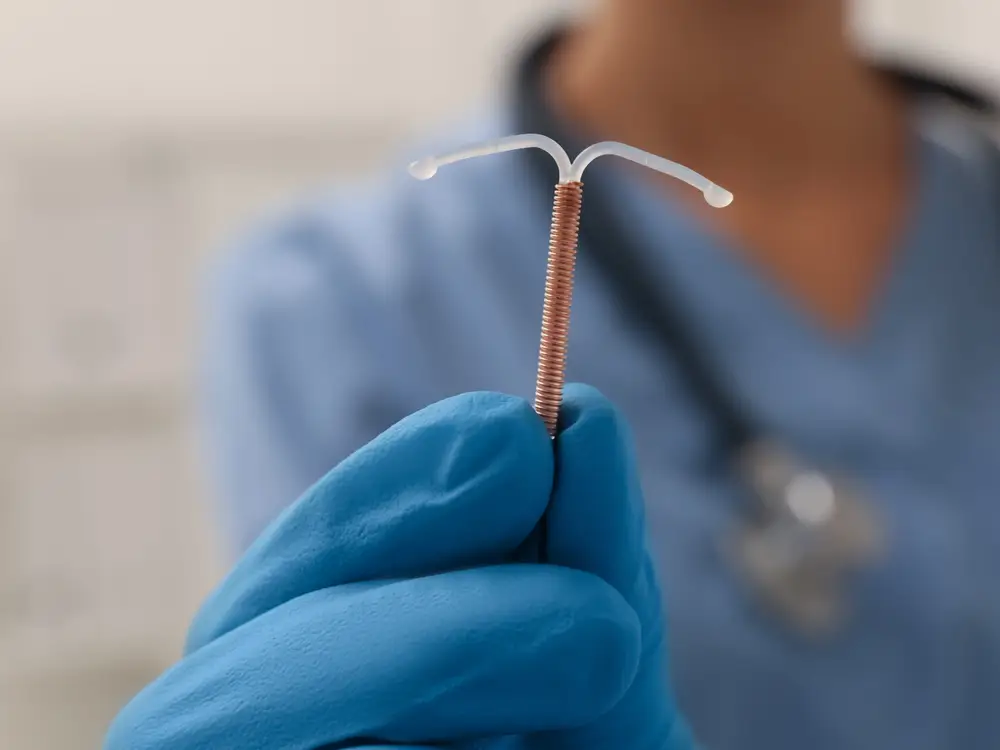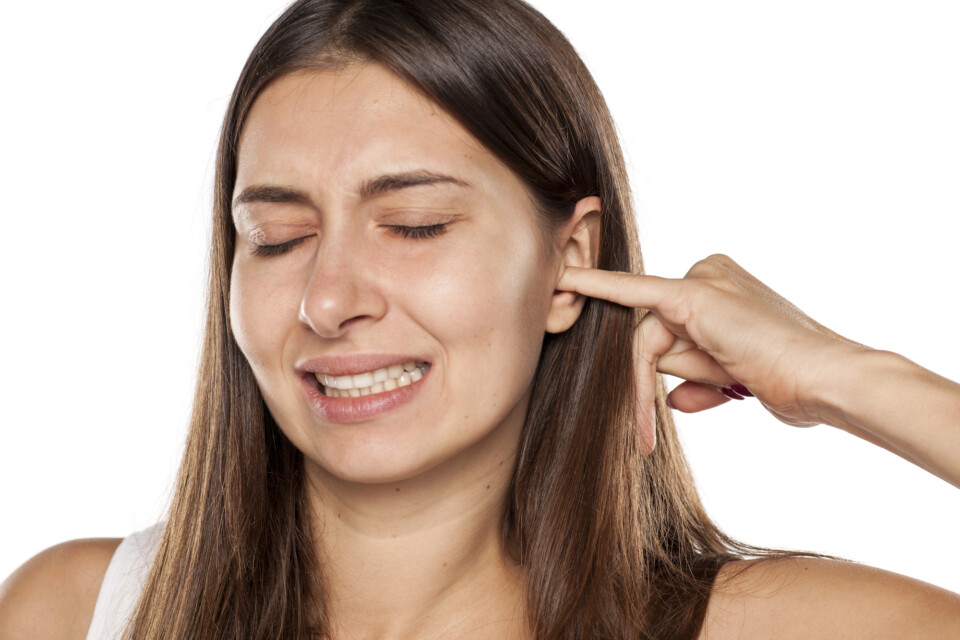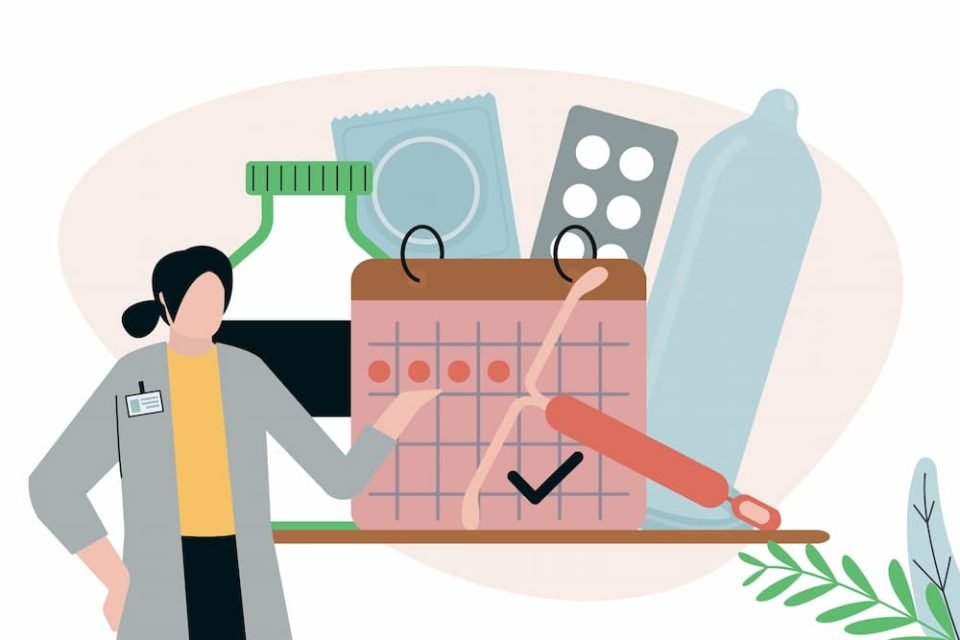Studies have shown that up to 70% of women using hormonal IUDs report significant improvement in heavy menstrual bleeding within the first year. This statistic highlights an important aspect of intrauterine coils that many women overlook. They offer more than just contraception.
When you think of an intrauterine device, contraception is often the first thing that comes to mind. This is understandable, given its primary function. Yet, at The Women’s Clinic, we’ve seen how these devices can change lives in ways that go beyond preventing pregnancy.
Hormonal and copper IUDs can tackle various gynaecological issues. They help manage heavy menstrual bleeding, alleviate period pain, and even support endometriosis treatment.
Let’s explore the other ways it can enhance your reproductive health and overall well-being.
Key Takeaways
- Intrauterine coils offer substantial health advantages that extend well beyond preventing pregnancy
- Hormonal IUDs can reduce heavy menstrual bleeding by up to 90% in many women
- Both copper and hormonal coils provide unique non-contraceptive benefits for managing gynaecological conditions
- IUDs can effectively address period pain, endometriosis symptoms, and fibroid-related concerns
- The Women’s Clinic provides comprehensive guidance to help you understand all potential benefits of intrauterine devices
- Understanding these broader applications empowers you to make a truly informed decisions about your reproductive wellbeing
Understanding Intrauterine Devices: More Than Just Birth Control
Many women are surprised to learn that the contraceptive coil they’ve heard about can provide significant health benefits beyond birth control. Before we explore these non-contraceptive advantages, it’s important to understand exactly what an intrauterine device is and how it functions.
A contraceptive coil is a small, T-shaped device—typically measuring about 32mm across—that we insert into your uterus to provide long-acting reversible contraception. This form of contraception is known as an intrauterine system, or IUS, and it represents one of the most effective methods of contraception available today.
The device itself is made of flexible plastic. Once inserted into the uterus, it remains in place and works continuously without requiring daily attention, unlike contraceptive pills.
How IUDs Work: Two Distinct Mechanisms
Let me explain how IUDs work. There are two main types: hormonal and copper.
The distinction between these is significant for understanding their broader therapeutic applications.
Hormonal IUDs release a progestogen hormone called levonorgestrel. This hormone performs three essential functions in your body.
First, it thickens your cervical mucus, making it extremely difficult for sperm to travel through your cervix into your uterus. Second, it thins the lining of your uterus, and thirdly, it can stop ovulation in some women. The hormonal coil includes brands such as Mirena, Kyleena, Skyla, and Liletta.
The copper IUD contains no hormones whatsoever. Instead, the copper coil releases copper ions that create an inflammatory response.
This response is toxic to sperm, preventing fertilisation before it can occur. In the UK, copper coils are widely available, whilst Paragard is the common brand in the US.
Both types of IUDs trigger your body’s natural immune response. This creates an environment that prevents sperm from reaching and fertilising an egg, making them an exceptionally reliable methods of contraception.
Effectiveness and Duration: Choosing the Right Option

The effectiveness of your IUD differs depending on the type you choose. Understanding these timeframes helps you make informed decisions about which device suits your needs best.
| IUD Type | Brand Name | Duration of Effectiveness | Hormone Status |
|---|---|---|---|
| Copper IUD | Paragard (US)/Copper Coils (UK) | Up to 10 years | Hormone-free |
| Hormonal IUD | Mirena | Up to 8 years | Levonorgestrel |
| Hormonal IUD | Liletta | Up to 6 years | Levonorgestrel |
| Hormonal IUD | Kyleena | Up to 5 years | Levonorgestrel |
| Hormonal IUD | Skyla | Up to 3 years | Levonorgestrel |
This plastic device inserted into the uterus provides reliable contraception without requiring you to think about birth control every day. You don’t need to remember pills, change patches, or schedule regular injections.
Understanding these fundamental differences between hormonal IUDs and copper IUDs helps you appreciate how each type can offer distinct benefits beyond their contraceptive function. The Mirena coil, for instance, releases hormones locally within the uterus, which creates opportunities for managing various gynaecological conditions.
Now that you understand the basics of how this form of birth control functions, we can explore the therapeutic benefits that make the IUS such a versatile medical tool for women’s health.
The Contraceptive Coil as a Menstrual Management Tool
Managing heavy periods and debilitating menstrual pain is a key benefit of hormonal coils. Many women find this transformational. At The Women’s Clinic, I discuss these concerns with patients seeking relief from menstrual symptoms.
Let’s talk about period pain, or dysmenorrhoea. This condition can significantly impact your quality of life, work, and emotional wellbeing. Women with severe cramps are often incapacitated for days each month, unable to work or participate in normal activities.
Using a hormonal IUD may substantially reduce both the intensity and frequency of these painful episodes. The progestogen hormone released by the coil thins the lining of your uterus, meaning there’s less tissue to shed during menstruation. This process also reduces prostaglandins—the chemicals your body produces that trigger those painful uterine contractions.
Women find considerable relief from menstrual cramps, often within the first three to six months of having the coil fitted. The improvement continues over time as the hormone consistently acts on the uterine lining.
Heavy bleeding, known medically as menorrhagia, affects approximately one in five women at some point in their lives. Women who experience heavy bleeding often describe soaking through sanitary products every hour, passing large clots, and feeling constantly exhausted. This isn’t merely inconvenient—it can lead to iron-deficiency anaemia, causing fatigue, shortness of breath, and pale skin.
The hormonal coil proves particularly effective at managing this condition. The contraceptive method works by significantly thinning the lining of the uterus through the local release of the progestogen hormone. Studies demonstrate that women who experience heavy bleeding can see their menstrual blood loss reduced by 86-97% after twelve months of using a Mirena coil.
Some women may even find their periods stop altogether, which is perfectly safe and often welcomed. This happens because the hormone creates such a thin uterine lining that there’s minimal tissue to shed. I reassure patients that this doesn’t mean the blood is building up elsewhere—it simply isn’t being produced.
The table below illustrates how menstrual management with a hormonal coil can help manage symptoms that many women struggle with monthly:
| Menstrual Symptom | Before Hormonal IUD | After 12 Months with Hormonal IUD | Clinical Improvement |
| Blood Loss Volume | 80-100ml per cycle (heavy bleeding) | 5-10ml per cycle or absent | 86-97% reduction |
| Period Pain Intensity | Severe cramps requiring painkillers | Mild discomfort or none | Significant reduction in dysmenorrhoea |
| Days of Bleeding | 7-10 days monthly | 1-3 days or none | 70-100% reduction in duration |
| Impact on Daily Life | Missing work, avoiding activities | Normal routine maintained | Restored quality of life |
This contraceptive method serves a dual therapeutic purpose that I find incredibly valuable for my patients. It provides reliable birth control whilst simultaneously addressing debilitating menstrual symptoms that have plagued women for years.
The hormone released locally in the uterus provides these benefits with minimal systemic absorption. This means fewer side effects compared to other hormonal treatments like oral contraceptive pills, where hormones circulate throughout your entire body. Women may experience the therapeutic benefits of progestogen exactly where it’s needed—in the uterus—without the broader hormonal effects.
By diminishing menstrual blood loss, the coil not only improves physical wellbeing but also contributes to greater emotional and psychological comfort. Women find they can plan holidays, attend important events, and wear what they want without the constant worry of flooding or breakthrough bleeding. The relief from period pain similarly allows them to reclaim days each month that were previously lost to debilitating cramps.
At The Women’s Clinic, I’ve witnessed how this simple device transforms lives by addressing menstrual difficulties that women had simply learned to endure. The hormonal coil represents a long-term solution that continues working effectively for up to five years, providing consistent relief without daily medication or frequent medical appointments.
Supporting Women Through Endometriosis and Fibroids
Women facing endometriosis or fibroids often struggle with managing symptoms and finding reliable contraception. These conditions affect millions in the UK, causing significant discomfort and disrupting daily life. At The Women’s Clinic, we consider the hormonal coil as part of a comprehensive treatment strategy. It addresses both reproductive health needs and symptom control.
Understanding endometriosis is necessary for effective management. This condition occurs when tissue similar to the uterine lining grows outside the uterus. It leads to inflammation, severe pelvic pain, painful periods, and discomfort during intercourse.
The hormonal IUD offers dual benefits for women with endometriosis. It provides contraception and addresses symptoms impacting quality of life. The progestogen hormone suppresses the growth of endometrial-like tissue and reduces inflammation in the pelvic region.
Many women with endometriosis experience significant pain reduction after a hormonal coil is fitted. Research shows the Mirena coil can be as effective as other hormonal treatments for managing pelvic pain. The added benefit is that you don’t need to remember daily medication.
Fibroids present different challenges that require careful assessment. These non-cancerous growths develop in or around the uterus, causing heavy bleeding, pelvic pressure, and frequent urination. The coil might be an excellent option for contraception and symptom management if your fibroids are small to moderate in size.
The hormonal IUD can significantly reduce heavy bleeding associated with fibroids by thinning the uterine lining. This provides relief from one of the most troublesome symptoms while maintaining excellent contraceptive effectiveness—over 99% protection against pregnancy.
However, there are limitations. Large fibroids that distort the uterine cavity may make insertion difficult or cause the device to be expelled. A thorough ultrasound assessment is essential before insertion.
For women with suitable anatomy, the hormonal coil offers an alternative contraception method. It addresses both pregnancy prevention and symptom management. You avoid more invasive surgical interventions while gaining relief from debilitating symptoms.
Among the many forms of birth control available, few offer such comprehensive therapeutic benefits for endometriosis and fibroids. The contraceptive effectiveness remains excellent while improving daily comfort and wellbeing—a combination that can truly transform your quality of life.
Hormonal IUDs During Perimenopause and Menopause
Perimenopause brings significant changes, requiring a new approach to contraception and symptom management. Hormonal shifts lead to irregular bleeding, hot flushes, and mood swings. Despite these changes, pregnancy remains a possibility, making contraception essential.
At The Women’s Clinic, we discuss how hormonal IUDs offer a comprehensive solution for perimenopausal women. They combine effective contraception with symptom relief, addressing multiple needs at once.
Reliable Pregnancy Prevention During Hormonal Changes
The hormonal coil is highly effective at preventing pregnancy during perimenopause. Less than 1% of women will become pregnant while using an IUD. This makes it a reliable choice, especially in your forties and early fifties.
Fertility declines with age, but unplanned pregnancies can still occur. These pregnancies carry higher risks, including an increased risk of ectopic pregnancy.
The hormonal IUD provides consistent pregnancy prevention without daily attention. You won’t need to remember contraceptive pills or worry about reduced effectiveness from missed doses.
Combining IUDs With Hormone Replacement Therapy
The Mirena coil is licensed for use as the progestogen component of hormone replacement therapy. It can serve a dual purpose during menopause transition. If you’re experiencing menopausal symptoms, your GP or menopause specialist can prescribe oestrogen to relieve these symptoms.
Your Mirena coil provides the necessary progestogen to protect your uterine lining. This combination, when combined with oestrogen therapy, is effective at preventing the endometrial thickening that oestrogen-only HRT can cause. Without this protection, oestrogen-only therapy would increase your risk of endometrial cancer.
This integrated approach to hormone replacement therapy simplifies your treatment regime. You receive comprehensive hormonal support without needing separate progestogen medications.
Managing Irregular Bleeding Patterns
The hormonal IUD helps manage the irregular bleeding that commonly occurs during perimenopause. Rather than experiencing unpredictable heavy periods for several years, many women find their bleeding becomes lighter and more manageable. Some women find their periods stop entirely.
This benefit extends beyond convenience. Managing irregular bleeding during perimenopause can significantly improve your quality of life. You’ll experience fewer disruptions to daily activities and reduced anxiety about unexpected bleeding episodes.
Long-Term Protection Through Multiple Life Stages
The dual function of preventing pregnancy but also managing perimenopausal symptoms makes the hormonal coil an elegant solution. The Mirena coil provides effective contraception for up to 8 years. This extended duration may take you through to natural menopause, typically confirmed after 12 months without a period after age 50.
This longevity means you won’t need repeated procedures or frequent changes to your contraceptive method. The coil works continuously in the background, providing consistent hormone levels and reliable pregnancy prevention throughout perimenopause.
| Benefit | How Hormonal IUD Helps | Duration of Effect | Additional Notes |
| Pregnancy Prevention | Over 99% effective at preventing pregnancy during perimenopause | Up to 8 years with Mirena | More reliable than contraceptive pills, especially with unpredictable routines |
| HRT Progestogen Component | Protects uterine lining when combined with oestrogen therapy | Licensed for 5 years as HRT component | Eliminates need for separate progestogen tablets or patches |
| Irregular Bleeding Management | Reduces heavy periods; 20% of users experience no bleeding after 12 months | Continuous throughout use | Particularly beneficial during perimenopause when bleeding patterns become unpredictable |
| Convenience | No daily medication to remember; works continuously | Entire duration of device (5-8 years) | Ideal for busy lifestyles during midlife transitions |
At The Women’s Clinic Edinburgh, we understand that every woman’s experience of perimenopause is unique. During your consultation, we’ll discuss whether a hormonal IUD is appropriate for your specific circumstances. We’ll consider your symptoms, medical history, and personal preferences to determine the best approach for you.
The hormonal IUD represents a sophisticated solution for women navigating the complexities of perimenopause. It addresses both the need to prevent pregnancy and the desire to manage perimenopausal symptoms. This offers comprehensive support during this significant life transition. You’ll have the confidence of reliable contraception alongside effective symptom management, all from a single, long-lasting device.
Expert IUD Fitting Services at The Women’s Clinic Edinburgh
Our Edinburgh clinic removes barriers to the contraception you need, offering expert IUD fitting services without referral. At The Women’s Clinic, we specialise in private contraceptive coil fitting. We provide expert care in a comfortable, unhurried environment. Choosing to have a coil fitted is a significant decision, and the prospect of coil insertion can understandably cause anxiety.
We’ve designed our service to prioritise your comfort, provide comprehensive information, and ensure you feel supported throughout the entire process. Our approach combines medical excellence with genuine empathy for your concerns.
Our service offers several distinct advantages. Firstly, you can book online with no referral needed. We’ve removed the administrative hurdles that can delay access to the contraception you need. Whether you’re seeking long-term contraception, emergency contraception, or therapeutic management of heavy bleeding, we can see you promptly.
Copper coils can be fitted up to 5 days after unprotected intercourse and are more effective than emergency contraceptive pills. This makes them an excellent form of emergency contraception whilst providing ongoing protection. Our contraception options extend beyond immediate needs to support your long-term health goals.
Our healthcare professionals are extensively trained in the insertion of an IUD and fit all types of coils. These include Mirena, Kyleena, Copper IUDs, and other intrauterine systems. We’ll help you choose the right option based on your individual circumstances and health needs.
What Happens During Your Appointment
The coil insertion procedure typically takes just 10-15 minutes. Before we begin, we’ll discuss your medical history, answer all your questions, and perform a brief examination. I always explain the process step-by-step so you know exactly what to expect.
We position you comfortably as you would be for a cervical screening test. Using a speculum, I gently examine your cervix and may clean it with an antiseptic solution. We then measure your uterus and carefully insert the IUD through your cervix.
You may feel cramping during insertion—this is normal and usually brief. We offer pain management options, including local anaesthetic to numb your cervix if you prefer. Some women experience minimal discomfort; others find it more uncomfortable. We adjust our approach based on your individual needs and pain tolerance.
After insertion, the hormonal IUD begins thickens the cervical mucus and preventing sperm from reaching your fallopian tubes. Depending on where you are in your menstrual cycle, hormonal coils begin effective contraception immediately if fitted during your period. If inserted at other times, you’ll need additional contraception for 7 days.
Copper coils work by preventing fertilisation immediately. They start protecting you from pregnancy the moment they’re inserted, with no waiting period required.
| IUD Type | When Inserted | Time to Effectiveness | Additional Contraception Needed |
| Copper IUD | Any time | Immediate | None required |
| Hormonal IUD | During period | Immediate | None required |
| Hormonal IUD | Other times | 7 days | Required for first week |
Comprehensive Aftercare Support
Following your procedure, we provide comprehensive aftercare guidance. You may experience cramping, light bleeding, or backaches for a few days—these are normal responses. We recommend taking over-the-counter pain relief and using a heat pad if needed.
We can schedule a follow-up appointment to ensure the coil is positioned correctly and address any concerns. Only a healthcare provider can insert, adjust or remove an IUD, so we remain your partner throughout your contraceptive journey.
Our Edinburgh clinic also provides sexual health screening. It’s important to remember that whilst IUDs provide reliable contraception, they don’t protect against sexually transmitted infections. We can discuss barrier methods for STI prevention during your consultation.
Whether you need emergency contraception today or want to plan for long-term contraception as part of your broader health strategy, The Women’s Clinic offers the expertise, convenience, and compassionate care you deserve. Our guide to contraception considers your individual circumstances, health conditions, and preferences.
Book your IUD fitting appointment online today—no referral needed, no unnecessary delays. We’re here to support you in taking control of your reproductive health with confidence and peace of mind.
Conclusion
The intrauterine coil is a pivotal tool in modern woman’s health. Its ability to prevent pregnancy is over 99% effective, making it a top choice for contraception. However, its benefits extend beyond just preventing pregnancy.
It offers significant advantages over not using contraception. Coils can manage symptoms of heavy bleeding, endometriosis, and fibroids. They also support women during perimenopause, providing both contraception and therapeutic benefits. This makes the IUD a unique asset in women’s healthcare.
At The Women’s Clinic Edinburgh, we see contraception as part of comprehensive care. We believe every woman should have expert guidance in reproductive health decisions. Our approach combines clinical expertise with a deep understanding of your unique situation.
I encourage you to book a consultation with us. No GP referral is needed. We’ll assess if an IUD is right for you, addressing your concerns with care.
If you’re looking for symptom relief, contraception, or both, we’re here to help.





